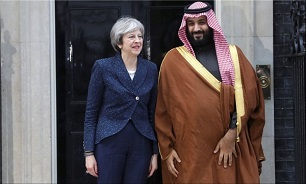UK Foreign Office Says It's Exploring A 'Sanctions Regime' with EU Against Saudi Arabia
 The UK's Foreign and Commonwealth Office (FCO) stated that London had been clear "that we need to see accountability for the horrific murder of the journalist Jamal Khashoggi".
The UK's Foreign and Commonwealth Office (FCO) stated that London had been clear "that we need to see accountability for the horrific murder of the journalist Jamal Khashoggi".
"We are exploring with EU (European Union) partners the potential for an EU global human rights sanctions regime, which could address such brutal human rights violations," an foreign office spokesperson told CNBC in a statement Monday.
"We will of course wait for the final outcome of the Turkish investigation before making any decisions," the spokesperson added.
The foreign office announced that it would base any decision on punitive action against Saudi Arabia on the kingdom's own explanation for Khashoggi's death.
"The actions Britain and our allies take will depend on two things: Firstly the credibility of the final explanation given by Saudi Arabia, and secondly on our confidence that such an appalling episode cannot — and will not — be repeated," it noted.
Saudi Arabia continues to strenuously deny any involvement in Khashoggi's death, it's foreign minister stating in October that the death happened during an "operation where individuals ended up exceeding the authorities and responsibilities they had". It has already announced forthcoming prosecutions of 11 suspects and it is seeking the death penalty for five of them.
A report by the CIA has purportedly come to a different conclusion, however, with media reports suggesting at the weekend that the CIA has said Saudi Crown Prince Mohammad bin Salman ordered the murder. Saudi's Foreign Minister Adel al-Jubeir said early Tuesday that the CIA's assessment of the murder was false. A full report could be released by the CIA on Tuesday, US President Donald Trump said.
CNBC has asked the UK Foreign Office for further detail on what kind of restrictions it could impose on Saudi Arabia and has asked for further detail on an EU global human rights sanctions regime.
International uproar over Khashoggi's murder has already translated into US sanctions at an individual level. The US Treasury Department announced last week "Magnitsky Act" sanctions against 17 individuals for their alleged role in the killing.
Sanctions on states, entities or individuals are already a part of the EU's punitive toolkit but there have been increasing calls for the region to develop a sanctions regime that targets individuals specifically on the grounds of grave human rights violations, similar to the Magnitsky Act.
Government officials from all 28 EU member states are meeting in The Hague on Tuesday to discuss such a proposal, the EU Observer reported Monday.
The UK had previously signaled that it could consider some form of punitive action against Saudi Arabia if the country was found to be complicit in Khashoggi's death.
"If the stories that we read about are true, and if you are asking me whether that will have consequences for the relationship with Saudi Arabia, then yes, of course it will," Foreign Secretary Jeremy Hunt told the BBC in mid-October. But he also added that he was mindful of the UK's "strategic partnership" with Saudi Arabia.
Germany issued a travel ban for 18 Saudi nationals allegedly connected to the crime from travelling in the continent's 26-country Schengen area on Monday.
There are both Turkish and Saudi investigations ongoing into the murder of Khashoggi, who was last seen alive on October 2 entering the Saudi consulate in Istanbul.
Turkish officials investigating the death said he was murdered and identified a 15-man Saudi "hit squad" who traveled to Istanbul to carry out the murder. Riyadh initially denied any involvement, then conceded that "rogue elements" had carried out a premeditated murder.
But it has vehemently denied that its king or crown prince ordered the murder and has sought to distance its royals from the international outrage at Khashoggi's death.
Message end/
